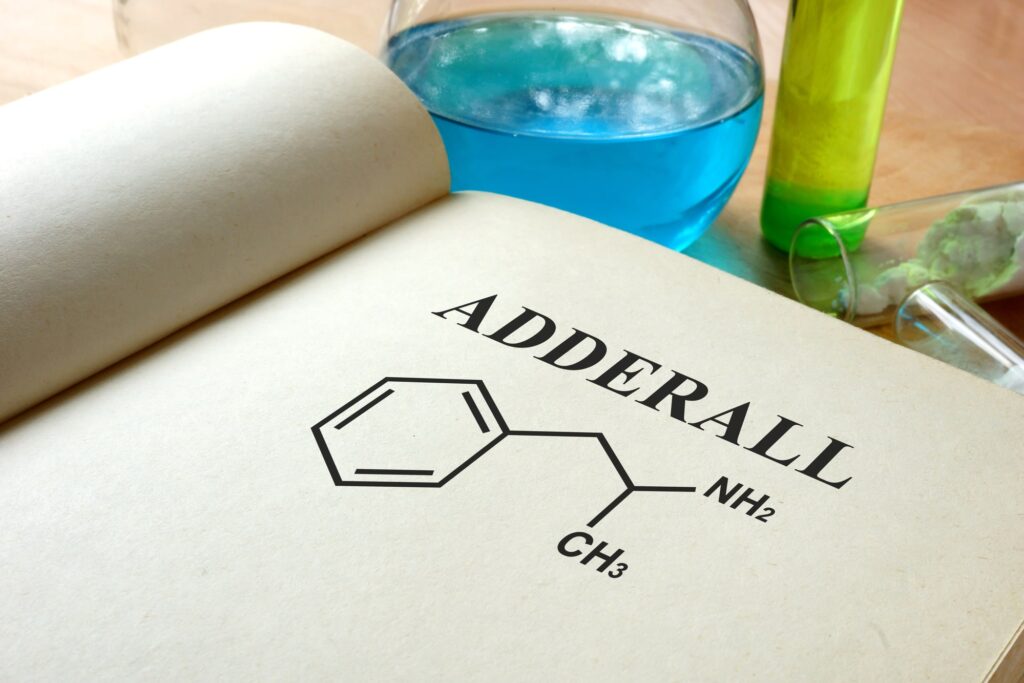Adderall dependence can occur after an extended period of use, even if taken as directed. Prescribed Adderall is typically used to treat attention-deficit/hyperactivity disorder (ADHD), but people may seek out the stimulant to help them stay awake, get high or be more alert. When you become physically dependent on Adderall, Adderrall withdrawal symptoms can kick in if you try to stop taking it.
Drug addiction is a complex disease that can cause many uncomfortable physical symptoms, which is why quitting is so hard. The safest way to quit Adderall is to seek assistance from a healthcare provider who can help you gradually wean off. Formal substance abuse treatment, such as a medical detox program, can help manage symptoms of stimulant withdrawal and lead to a successful recovery.
If you or a loved one is struggling with drug abuse, learn more about the Adderall withdrawal timeline and what physical or psychological symptoms to expect.
What Is Adderall?
Adderall is a Schedule 2 controlled substance containing a combination of amphetamine and dextroamphetamine. These central nervous system stimulants affect nerves and brain chemicals affiliated with hyperactivity or impulse control. The drug is commonly prescribed to treat ADHD and narcolepsy.
Although Adderall is currently accepted for medical use in the United States, severe restrictions are placed on it due to the substance abuse problems associated with it.
Common Side Effects
Adderall is extremely habit-forming and can lead to substance use disorder. If you suffer from depression, bipolar disorder or other mental disorders, taking Adderall may worsen your condition or cause psychosis. Other common side effects of Adderall include:
- Stomach pain
- Loss of appetite
- Dizziness
- Headache
- Trouble sleeping
- Mood changes
- Weight loss
- Fast heart rate
What Is Adderall Withdrawal?

People who take large doses of Adderall for extended periods of time risk developing a physical dependency on the drug. Once this happens, tolerance builds up, meaning it takes larger or more frequent doses to feel the same effect as before. In 2020, about 5.1 million people aged 12 or older reported Adderall misuse. About 758,000 also reported having a prescription stimulant use disorder.
Those with an Adderall addiction often feel the drug no longer helps them concentrate or feel energetic. However, quitting Adderall cold turkey can make it hard to function properly, which is the first sign of withdrawal.
Adderall withdrawal is the body trying to resume normal functioning without assistance from the drug. While withdrawal from Adderall is rarely life-threatening on its own, the physical and emotional symptoms can be extremely unpleasant.
Withdrawal Symptoms
Common withdrawal symptoms of Adderall provide the opposite effect of the drug. Adderall is meant to increase energy, concentration and euphoria, but an Adderall crash that follows after a person stops taking it reverses these effects.
Post-acute withdrawal symptoms from abusing Adderall can include:
- Severe depression
- Headaches
- Physical fatigue and oversleeping
- Irritability
- Increased appetite
- Achiness
- Anxiety
- Nightmares
- Suicidal thoughts
Sometimes people who experience Adderall withdrawal symptoms may seem hungover or drunk. People who have a higher tolerance for the drug may also experience withdrawal symptoms that are more severe.
How Long Does Adderall Withdrawal Last?
Adderall withdrawal symptoms can start soon after you stop taking it. The withdrawal timeline can last anywhere from 5 days to a month, depending on the person and the intensity of their Adderall abuse.
The first signs of withdrawal can show up just a few hours after the last dose. Intense depression and physical and mental exhaustion are common symptoms during this time. Throughout the first week, symptoms and drug cravings usually intensify, leading to headaches, nightmares and a depressed mood. This is often the peak of withdrawal, and symptoms will generally start to fade around the 5-7 day mark.
Individuals who’ve been taking the drug for a long time and in large doses may experience a longer period of Adderall withdrawal. Your genes, health history and a family history of addiction can also affect the Adderall withdrawal timeline. The type of Adderall you were taking may influence the duration of amphetamine withdrawal as well.
Instant and extended-release are two common types of Adderall. Regular Adderall is an instant-release drug that starts working quickly, with effects lasting about 6 hours. Adderall XR, which is an extended-release, is meant for constant use. Withdrawal from Adderall XR usually leads to longer periods of psychological and physical symptoms.
Recovering From an Adderall Addiction

Managing withdrawal symptoms can be difficult, and there isn’t a specific treatment to assist you through addiction recovery. However, following professional medical advice can ensure you get off the drug safely. Instead of quitting cold turkey, medical professionals may recommend lowering your dose and stopping gradually over time.
While most withdrawal symptoms will be unpleasant, some can be dangerous. It’s important to seek emotional support if your depression worsens or you begin having suicidal thoughts. A healthcare provider may recommend counseling or prescribe antidepressants for additional help.
Adderall Detox
An Adderall detox program can help individuals safely manage withdrawal symptoms. Detoxification is the process of getting the drug out of your system. Once Adderall leaves the body, withdrawal symptoms kick in, making it hard for someone to function at their regular level without relapsing.
Many treatment centers that have addiction specialists can help Adderall users reduce their dosage and provide other support as needed to make the withdrawal process more bearable.
Seek Help for Addiction Treatment
Getting through the withdrawal process for Adderall addiction alone can be difficult. If you or a loved one is struggling with Adderall abuse, help is available. Addiction treatment with medical supervision can make the process more bearable and ensure you get the support you need.
Summit Detox in Boynton, Florida, offers a variety of treatment options designed to meet each person’s individual needs. Call us today at (888) 995-5265 to speak with a trained professional and reclaim your life from substance abuse.



